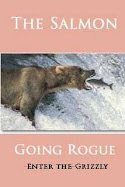…The Union soldiers expected that as so often before their commanding general would admit defeat, give Bobby Lee the best of it and pull back across the Rapatan… The men were ordered to move back, form up in column on the Brock Road and prepare to move out. Wearily the men came back grumbling that nothing had changed, that Bobby Lee had outfought yet another Union general. They formed column, shouldered their muskets, and prepared to march-and then General Grant and his staff came jingling out of the night. The soldiers stepped back and let the horseman past and then realized, suddenly, that Grant was riding south. It took some little time for the Union soldiers to realize what was happening. Most of them had no idea which way they were facing when the march began, but some did, and the story quickly spread along the column from regiment to regiment: Grant and the army were indeed marching south. Spirits revived. Here and there regiments even began to cheer…
Grant was well aware that pressure on the president was mounting. Support for the war had waned as the cost and the casualties had mounted. General George B. McClellen, the former commander of the Army of the Potomac, fired by Lincoln, was now the Democratic candidate for president running on an anti-war platform, promising to negotiate a settlement with the south.
George Bush is at the same crossroads that Grant found himself in the Wilderness. Like Grant the president is now listening to his staff as he decides which direction he will take. He can either retreat and wait for an inevitable fight on another day, as has been the case for the last 27 years, or instead march on, completing the strategy that he laid out in the 2002 State of the Union Address.
As he makes his deliberations and formulates his plan the president needs to consider why he was re-elected in 2004. The majority of the American people saw in him the same thing that Lincoln saw in Grant. Lincolns response to those that were demanding Grants dismissal after the debacle at Shiloh was "I can’t spare this man…He fights". Grant determined the strategic goal and focused on the ways to achieve that goal. For him, fighting to a final victory was the only option in 1864 and for us it is the only option in 2007.
March on Mr. President.
Neillands, Robert. "Grant, The man who won the civil war." 2004


_edited-1.jpg)




No comments:
Post a Comment